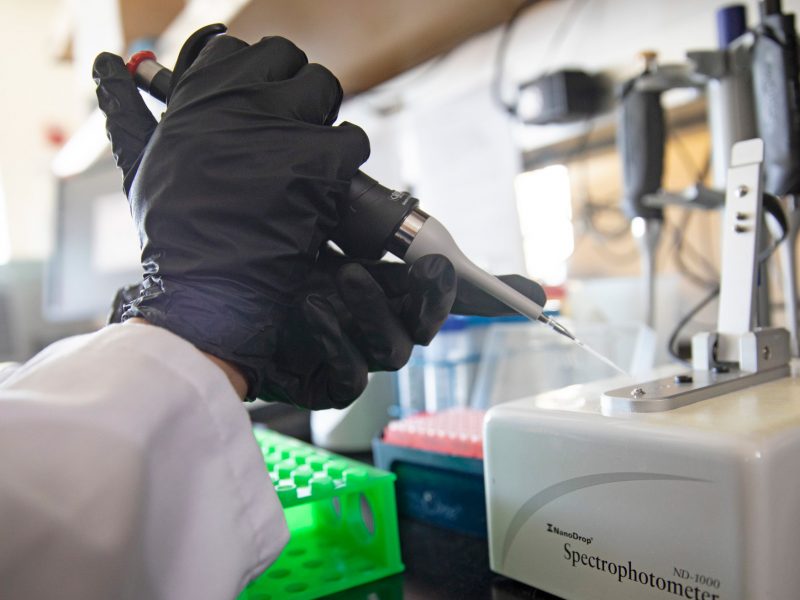Intellectual property protection FAQs
We have several options to simplify the process. You may:
- Use the Invention Disclosure form available online on the NAU Inventor Portal.
- Set up a meeting with NAU Innovations to discuss the idea.
- Email NAU Innovations with any related information you have on the idea, including grant proposals, presentations, manuscripts, and any written descriptions.
As a guideline, the general criteria that define intellectual property include:
- novelty (it is previously unknown), non-obviousness (not a simple improvement that could be made by someone trained in the area)
- utility (the invention must be useful in a practical sense)
- enablement (you must be able to describe it in sufficient detail so that someone skilled in the field can use it for the stated purpose).
A quick look into the US Patent and Trademark Office or the European Patent Office may help you to see how your invention compares to current patents.
No problem. When you disclose your invention to NAU Innovations, please list the inventor at the other institution. We will then contact their technology transfer office and establish an intellectual property agreement with them.
In accordance with US patent laws and NAU intellectual property policy, an inventor is an NAU employee who has made an intellectual contribution to the conception of the innovative idea. It is important to recognize that not every individual working on a project will be an inventor. Those listed as authors on a publication are not automatically inventors. Additionally, students working under direction and guidance are not inventors unless they have intellectually contributed to the conception of the idea. Determining correct inventorship is critical as a patent may be otherwise invalidated.
Yes, students may be inventors if they have intellectually contributed to the conception of the novel idea and the related project has employed significant use of board or university resources. However, intellectual property created through senior capstone projects or other student-created works are not applicable, as the board takes no ownership in those works.
This does occur on occasion. In such cases of a dispute, we will look to the claims of the patent application which specifically describe each novel aspect of the invention. The candidate inventors will review the claims of the patent application and initial the claims to which they have made an intellectual contribution. Only those who have contributed to at least one claim are considered inventors. If necessary, we may conduct inventor interviews with an attorney to resolve any conflicts.
It is important to understand that inventorship may change over the course of patent prosecution as claims may be removed, which may relate to an individual’s specific intellectual contribution.
The invention disclosure system is designed and implemented to provide a beneficial platform for NAU’s researchers to legally protect significant research innovations, with the goal of translating great ideas and inventions into practical results. Part of the NAU Innovations mission is to translate these results into commercial applications as products and services for the greater good. It is also designed as a support system to protect the value of an inventor’s ideas, to add to their scholarly activities, and encourage continued innovation in a positive and proactive environment.
Please submit an invention disclosure when you believe that you have created intellectual property. Submit an invention disclosure before submitting your idea for publication or presentation in a forum such as a seminar. Submitting a disclosure before manuscript submission or seminar presentation will allow NAU Innovations to review the disclosure and file a provisional patent application to maximize the probability of legal protection for your invention.
If you have any questions regarding the appropriateness and timing of filing an invention disclosure or what constitutes intellectual property, please do not hesitate to contact NAU Innovations.
Your submitted disclosure will undergo initial screening. After screening, your disclosure will become active and a new invention case file will be created. Once your invention disclosure has been accepted, an NAU Innovations will contact you to arrange a meeting. The purpose of the meeting is to discuss further details of your invention, to discuss any additional related ideas or additions, and to discuss any activities that may have been performed relating to your invention (other inventors, collaborators, publications, seminars, etc.).
After this meeting, your invention will be evaluated to determine its merit as intellectual property and the level of interest that NAU may have in commercializing the invention. You may be asked to continue further development of the invention at this time in order to add to its value and increase the probability of legal protection.
If your invention moves forward after this assessment period, it means that NAU has chosen to invest significant time and resources into protecting your invention as intellectual property, and appropriate action will take place to protect (patent or copyright) the invention. Once your invention has been protected, a process of identifying potential commercial licensees will begin.
